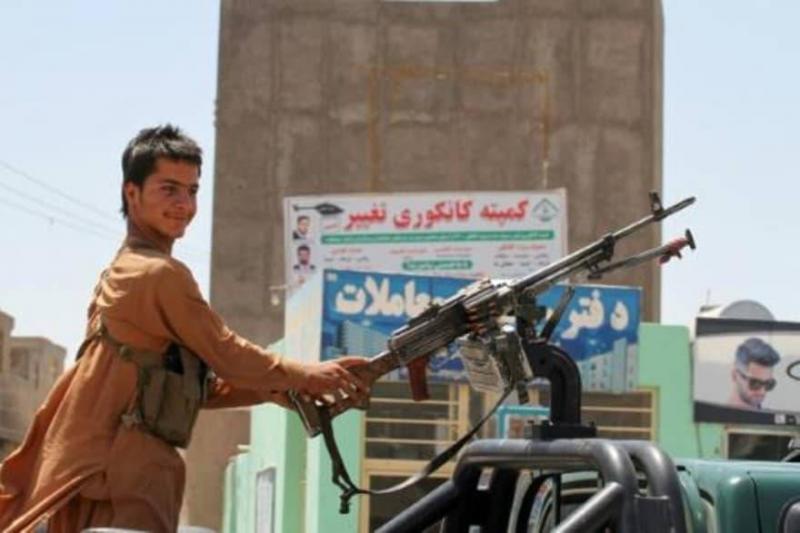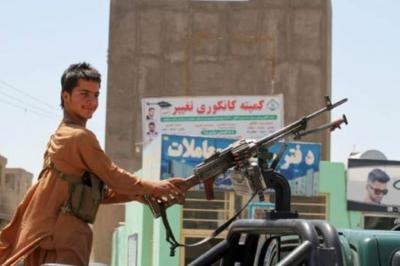On Monday morning, the Taliban took control of five of Afghanistan's 34 provincial capitals after seizing three of them the previous day, including the city of Kunduz, in a major assault that seems to render the military unable to counter it. Within just a few hours on Sunday, the insurgents captured Kunduz, which they had besieged for several weeks after violent fighting, and then took control of Sar-e Pol and Taleqan, the capitals of the provinces located to the south and east of Kunduz, respectively.
Zabihullah Hamidi, a resident of Taleqan, told AFP that violence began in the morning and ended with the Taliban taking control of the city "without much fighting," and that official officials and security forces fled the city. An official security source confirmed that Afghan forces and local leaders had retreated to a nearby area, stating, "The government failed to send us assistance, and we withdrew from the city on Sunday afternoon."
Taliban spokesman Zabihullah Mujahid confirmed the movement's control over Taleqan, noting the "return of security" to it and to Kunduz and Sar-e Pol, which fell into the group's hands in the morning. An AFP correspondent in Kunduz reported that the Taliban seized all the main buildings in the city. This city, with a population of about 300,000, has been captured by the insurgents twice in recent years, in 2015 and 2016, and is a strategic crossroads in northern Afghanistan between Kabul and Tajikistan.
The capture of Kunduz marks the Taliban's most significant military success since the beginning of the offensive launched in May, coinciding with the withdrawal of international forces that is expected to conclude by August 31.
**Sensitive Hub**
At the end of June, the Taliban seized the Sher Khan Bandar border crossing in southern Tajikistan, which is a sensitive hub for economic relations with Central Asia. The Ministry of Defense stated that government forces are trying to regain control of key areas in Kunduz, noting that "commando units launched a cleansing operation" that included "some places including the national radio and television buildings."
Ibrahim Thoreal Bahis, an advisor at the International Crisis Group, told AFP that "the seizure of Kunduz is very important as it will allow for the release of a large number of Taliban fighters who can then be mobilized in other parts of northern Afghanistan." Following Kunduz, Sar-e Pol also fell to the Taliban. The insurgents had seized Sheberghan, the stronghold of renowned warlord Abdul Rashid Dostum, on Saturday.
Rights activist Barwina Azimi told AFP via phone that administrative officials and the remaining armed forces withdrew to barracks about three kilometers from Sar-e Pol. For his part, Marwais Stanikzai, spokesman for the Ministry of Interior, confirmed that reinforcements, including special forces, had been sent to Sar-e Pol and Sheberghan, adding that "the cities that the Taliban wish to seize will soon become their graves."
**Rapid Advance**
The inability of the authorities in Kabul to control northern Afghanistan may be critical to the government's chances of survival. Northern Afghanistan has long been considered a stronghold of opposition against the Taliban, where the group faced the strongest resistance when it came to power in the 1990s. The Taliban ruled the country from 1996 to 2001, imposing its strict interpretation of Islamic law, before being ousted by a U.S.-led international coalition.
The insurgents also captured the city of Zaranj, the capital of Nimroz Province (south), on Friday, bordering Iran. Kandahar (south) and Herat (west), the second and third largest cities in the country, have faced assaults from the insurgents for several days, similar to the situation in Lashkar Gah (south), the capital of Helmand Province, which is one of the rebel strongholds.
The speed of the Taliban’s advance has surprised observers and Afghan security forces, despite assistance received from U.S. air forces. The United States has intensified its airstrikes, as stated by Major Nicole Ferrara, a spokesperson for the U.S. Central Command, to AFP on Saturday. She stated that "U.S. forces have carried out several airstrikes in recent days in defense of our Afghan partners." The fighting and bombings have forced hundreds of thousands of Afghans to flee their homes.




